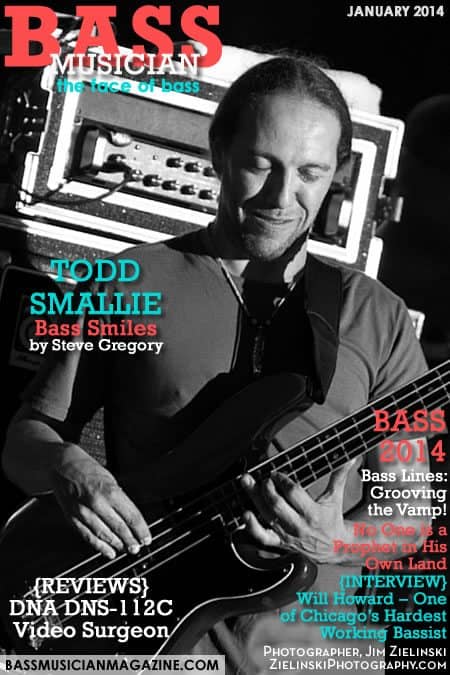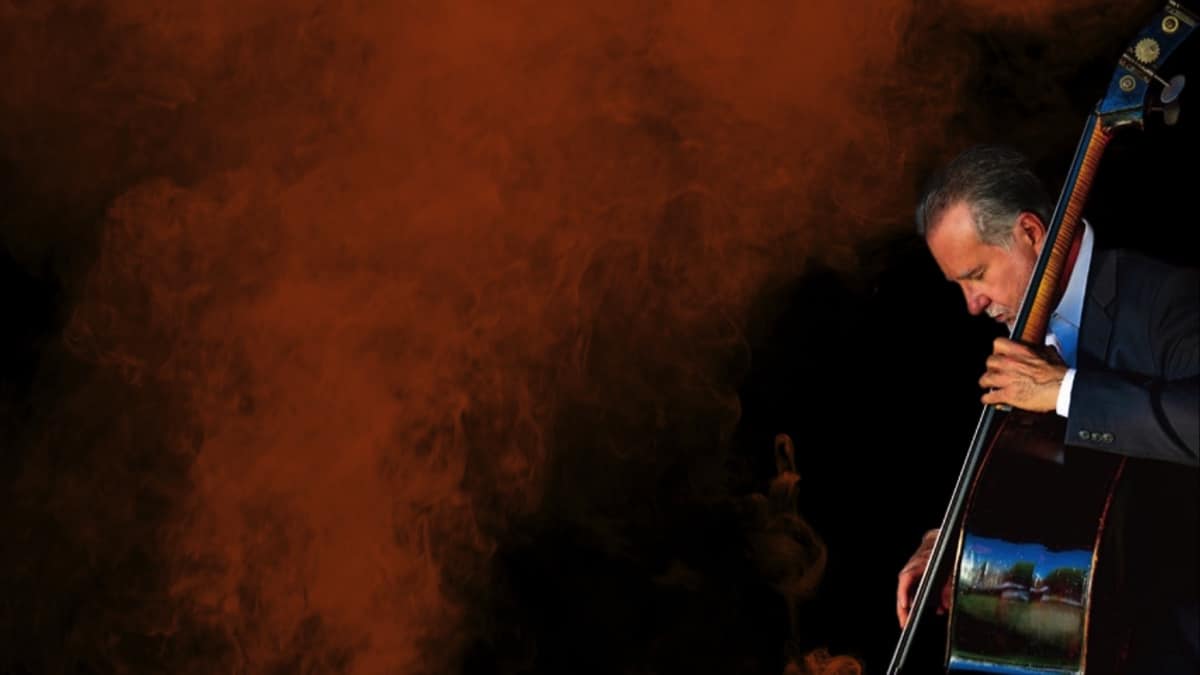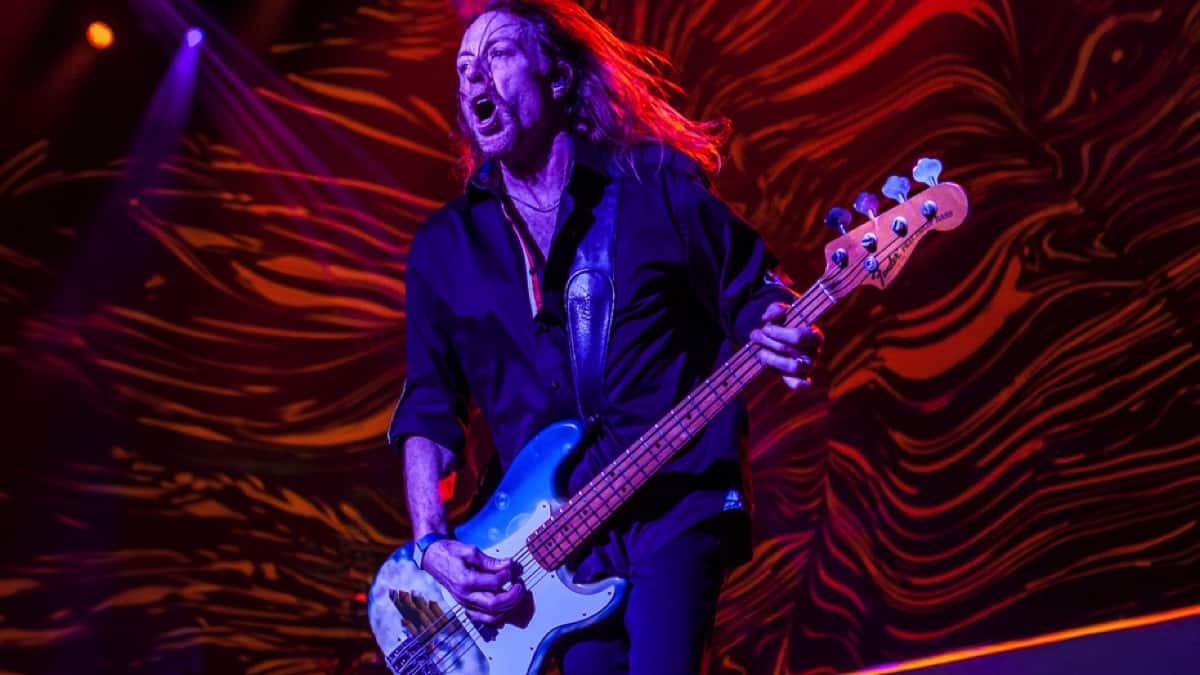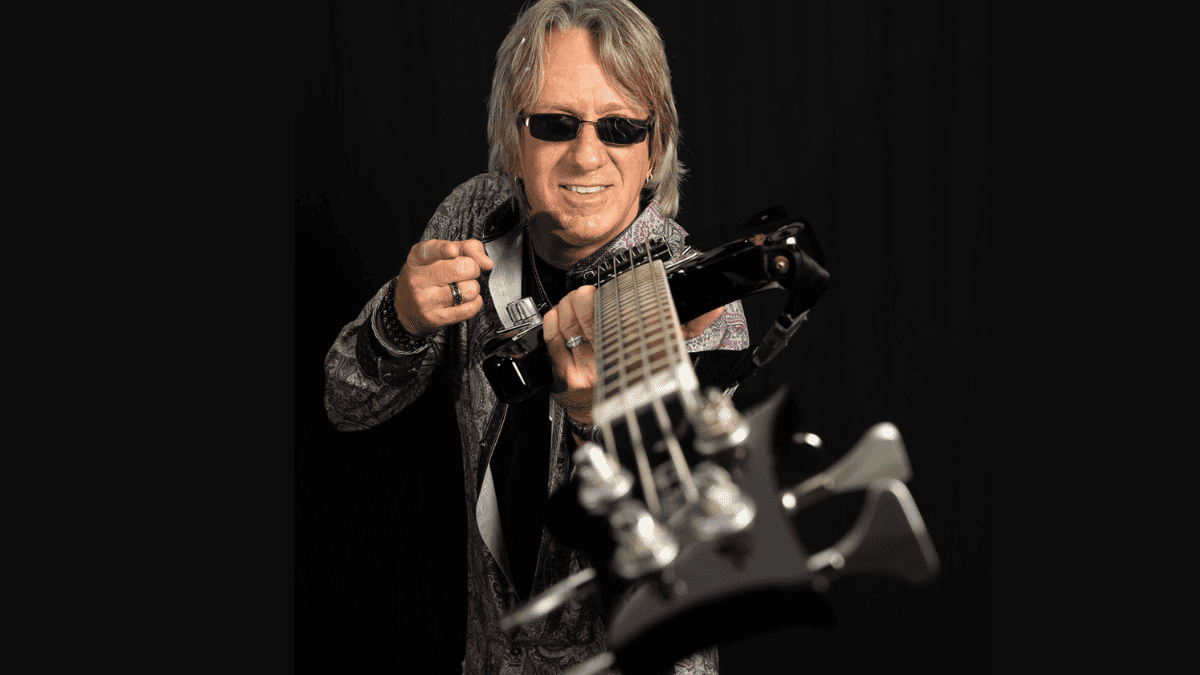Cover
Todd Smallie: Bass Smiles – Bass Musician Magazine, January 2014


Todd has every right to smile, as he continues on his amazing musical journey, which began in Atlanta during the late ‘80s and early ‘90s. During this era, Atlanta was a musical hotbed for bands of all flavors, but especially for those that would later be recognized as the forefathers of the jam band scene. Col. Bruce Hampton, Medeski, Martin, and Wood, Tinsely Ellis, and many others were playing in and around the “Gate City of the South” and influencing an entire generation of musicians, including Todd. It was members of Hampton’s group, the Aquarium Rescue Unit, who noticed Todd’s musical talents and connected him with a young guitar prodigy named Derek Trucks.
The teenaged Trucks formed the Derek Trucks Band, featuring Todd at the bass chair. The group made an immediate impact with the release of their debut album in 1997. Fans and critics alike praised the record and the band, not simply due to the talents of Derek combined with his youth, but also for the depth of knowledge and groove that flowed from the group. At the center of the music was Todd’s bass, pacing relentlessly on standards like “Mr. PC” and adding harmonic ornamentation to tunes such as “D Minor Blues”. Even as early as the first album, an obvious connection is heard between Todd and drummer Yonrico Scott. The two paired together perfectly, challenging each other in a push-pull conversation that never left the music ungrounded.
The band hit the road, honing their unique fusion of blues, jazz, and funk. Their second album, “Out of the Madness”, was released in 1998. The next year marked a new chapter for the band, when original keyboardist Bill McKay left the band and was replaced by Kofi Burbridge. That year’s recording, “Joyful Noise”, highlights Todd returning to more of a bass-centric approach, allowing Kofi to fill the harmonic gaps in songs. The result is a propulsive, full-bodied sound that allowed Todd to roam the fretboard and lock into grooves with his outstanding rhythm section mates.
The road was always a proving ground for Todd and the band, logging countless shows across the country. The constant gigging allowed Todd to dig deep into his instrument, stretching his improvisation skills every night. Indian and Pakistani influences were also entering the band, with Todd providing raga-like beds for soloists, pedaling to create sonic tension that would then explode into full-tilt exploration for the band. The varying mixture of influences can be heard on the group’s next recordings, “Soul Serenade”, “Live at the Georgia Theater”, and “Songlines”.
The Derek Trucks Band continued their sonic exploration and released “Already Free” in 2009, which would garner a Grammy award Best Contemporary Blues Album. The band released “Roadsongs” in 2010, after which the group separated to pursue other opportunities.
Taking a break of only a few months, Todd next joined forces with JJ Grey and Mofro. Todd’s bass work immediately added a new dimension to the blues, funk, and soul of Grey and the group. A diversion from the free improvisation style of the Derek Trucks Band, Todd’s work with Mofro focuses on laying down the perfect groove for each song. Excellent examples of Todd’s work can be seen and heard on the “Brighter Days” DVD, which was recorded live at the Variety Playhouse in Atlanta.
Most recently, JJ Grey and Mofro have released “This River”, which features Todd laying down solid bass work for a wide variety of R&B, funk, and soul tunes. Songs on this, and previous albums, are pushed to new limits when the group is on the road, with Todd adding an infectious energy to every set.
Throughout his fast past career, listeners can hear Todd’s joy for the work he is doing come through. With Derek Trucks, the bass was at home in improvisation, pushing members’ solos to fly higher. With Mofro, Todd has found happiness in playing the songs behind JJ Grey’s soulful singing. Other gigs find Todd playing fusion, funk, soul, jazz, R&B, and anything else that he enjoys.
And so, Todd Smallie is smiling again. “I really do feel fortunate, that’s why I smile. I’ve been gifted to do this. It’s a true gift.”

Photographer, Jim Zielinski ZielinskiPhotography.com
You were based in Atlanta for a significant portion of your career – did you grow up there as well?
I lived there since ’84, since I was a kid. I was 14 years old and lived there until a year and half ago when I moved to Colorado. I went to middle school and high school and then to Atlanta Institute of Music.
I definitely grew up in Atlanta musically and that was really fortunate. Growing up in high school there was a great music program with their jazz band in 8th and 9th grade. After that, I really got involved in private lessons and had a few teachers. My parents were really into it, so my dad would take me to see Iron Maiden and then take me to a jazz brunch. We’d go to the country club and see Travis Tritt when I was 16-17 years old, just crazy things like that. He would run us around and was a diverse listener and steered us that way as well. The house went from anything from Weather Report to Simon and Garfunkel. A lot of singer-songwriters, a lot of rock and roll, jazz, classical music…they were into it.
Atlanta was a great spot. I went to the Institute with Russ Rodgers, who is a phenomenal teacher and a great musician. He had, in my opinion, just a really great plan of attack: get the basics down and then start truly progressing and escalating your playing. Learning the changes, learning the scales, learning how to read, and all of that. He was a great teacher there. Then Randy Heoxter was the musical director at that time and he was another great educator and piano player. Jimmy Herring happened to be teacher there at that time and it was through him that I got to meet Col. Bruce [Hampton], Jeff Sipe, Oteil [Burbridge]. I was really fortunate to be around at that time, around ’91-’92. A lot was going on around there.
The time period of the early 90’s was a prime time for the Atlanta music scene. What area musicians were influencing you at that time?
There were a lot of great musicians who went through there: Medeski, Martin, and Wood were playing around there a lot, Col. Bruce, Ricky Keller, Tinsley Ellis…I could go on and on. There was also a great jazz scene and there were a lot of places to really experiment. At that point I wasn’t playing with Derek, but I had been playing with a lot of cool musicians who I really looked up to. We used to laugh – we’d go in on some gig and at some point you were just sitting there playing with your effects pedals after you got feedback going. It was all Albert Ayler, Sun Ra inspired stuff!
There were so many avenues to explore and so much great music of all genres. Just the area in general – the Carolinas, Florida – it was just a great spot. And I wasn’t that far from New Orleans! I did a lot of time in New Orleans with guys that I played with. I did some corporate band, some original stuff. New Orleans had a huge impact on me – two of my best friends from high school went there and we’d go down for a jazz fest from about ’88 on.
It definitely helped out, being in the Southeast – Nashville, New Orleans, even the Carolinas – I was really inspired by bluegrass just as much. I don’t think it comes out in my playing much, since I don’t do those gigs full-time or anything, but just being the area and knowing the magnitude of it. And then getting into the Delta blues guys: Sun House, Booker White, and so-called newer ones. Just to have that side and being close to it lets you feel like you’re immersed in it growing up in the southeast.
You mentioned Jimmy Herring was teaching at Atlanta Institute of Music when you were there. Was it through him that you hooked up with Derek Trucks?
He was teaching at the school and at first it was just a thing where I looked up to him. You immediately realize that at 20 years old you’ve met someone like him who was just naturally just a step ahead. You could tell in the late 80’s and early 90’s that there was just something special about him. I met him right before he joined Aquarium Rescue Unit. When he joined the band he was like, “You gotta come out and see the band I’m playing with. You’re going to freak out!” I knew it was going to be awesome, just from hearing Jimmy play and being in his classes, but holy cow! When we went to see them we were just floored. I remember we went to the Georgia Theater to see them the first time and I got to meet those guys.
I have to admit that Jeff Sipe was more of the reason that I hooked with Derek – him and Bruce. They would come out, hang out, and sit in with the bands. When Derek was looking for a bass player, they recommended me and I was lucky to fit in. Derek and I really hit it off. I was floored by the blues knowledge already, out of this 12 year old. He just knew all of these hip guys. He was into Elmore James and Duane and of course I had been into the Allman Brothers growing up in Atlanta. My family listened to them and I kind of grew up on it, so I was flattered to be around those guys.

Photographer, Jim Stanford www.jhunderground.com
When you first started playing with Derek, you were playing six string bass and using that to fill some of the space with chords, right?
I did. In fact a majority of the albums up until “Joyful Noise”, pretty much the first 3 albums, were cut on a Modulus and Curbow. It was something that I was getting into, just by coincidence. I was really into Anthony Jackson and John Pattitucci and those guys in the 80’s when I was growing up in high school. I was really lucky – in 1986 most kids didn’t listen to Chick Corea Elektric Band, but I was lucky to be around older musicians who listened to “Return to the 7th Galaxy” and “Romantic Warrior”.
When the Derek Trucks Band got going, you explored a lot styles. It was common for you to play anything from blues to jazz to fusion, or even a jazz standard like, “Mr. PC”.
Yonrico and I had played some of those tunes and even in school you learn certain standards and go through those things and then play them on gigs. When Derek started getting into that, you put that element in there, treating the slide as a saxophone. That was a reason I played a lot of 6 string as well. With one guitar, it was an easy convenience to get some of the chordal stuff, maybe not even as much on the albums, but I really got a chance to do it live. Col. Bruce and those guys completely influenced us to mess with the song, do some changes, don’t play it the same, don’t just try to copy it note-for-note. It’s easy to get up and transcribe what someone does, note-for-note, but Kofi and Oteil and Jeff were like, “Forget that – mess with the changes. Do some different things.” That led to us being so across the board, musically
Jeff got us into Nusrat Fateh Ali Khan and Pakistani Qawwali singers, then into Ali Akbar Khan and the Indian side, where the obvious is Ravi Shankar. All of that just blew us away, so we’d take those elements a little bit and use our instrumentation. We would have the Trane raga bed that he would play on My Favorite Things and we would try to cross those two things. Droning one chord while everyone else is playing changes and that led up to playing more of the Indian raga thing. Derek, by the time he was 15, was immersed into Miles and Coltrane and Ali Akbar Khan. We went to (Ali Akbar Khan’s) school in San Percel and hung out for the day and took a couple of classes. I really enjoyed expanding things there, instead of just being some rock-funk band. I think we would get tired of doing that all night long. Keep ‘em interested!
You were covering a lot of sonic territory, but the landscape changed a bit when Kofi Burbridge joined the band.
Sonically, it was completely different. Kofi is such an incredible chordal master on the instrument. He could play anything: classically trained, jazz studied, and can hear anything…it’s insane! At that point I didn’t need to cover the chords. Even with Bill (McKay) in the band I didn’t have to do it as much, I pretty much did it as a guitar sound for backup.
I kind of felt like getting back to basics and we were going to a rock, blues, R&B band and the Fender just fit in so much better. Just sonically, I missed the sound of it. There was the “Fender thing”, just getting the basics. In fact, since that change happened, all of my souped up basses have a passive switch on them, just to have it.
I definitely have a basic sound and with Derek it was pretty straight ahead, same with JJ. It’s pretty simple sound, but there’s something about a Fender. You plug it up and you’re like, “This thing sounds terrible!” It’s flat, not doing anything. Then you get up with a band or you get up in the studio and it’s sitting there perfectly! You don’t have to do anything, just turn up the amp and play right through. At that point, I went all old school and all passive. I have to admit though, I have a new PRS bass that they sent me a couple of months ago and man, I really dig it. It’s one of the best active basses I’ve ever owned personally…or even played for that matter. I really dig it. I go back and forth, play the Fender on a few tunes then play the “Jaco fusion master” thing, all souped up.
One connection that seemed particularly strong in the Derek Trucks Band was between you and Yonrico Scott.
Absolutely. I think there was a great musical connection. When we hooked up with Rico, we really hit it off musically. I was 24 at that point and Derek was 15 or so, and Yonrico was impressed that we were into a lot of different music and that we covered Miles and all of these great jazz guys and were immersed in Wayne Shorter. Automatically, we had both “studied from the same book”.
Rico was a mentor to Derek and me. He had been around the block; he was 12 years older than me. When we hit it off, it was a great blessing. Rico and me hit it off on every level, musically. He’s not just a drummer – he plays keys, he sings, he writes. We definitely connected on a telepathic level. You’re trying to heighten your awareness and improvise with those around you.
One of the greatest things I took away from playing with Kofi and Yonrico was the ability to simply listen. Don’t overdo it. Simply listen, make music. Stop trying to show off.
How do you feel you grew musically over the years that the band developed?
I think I grew harmonically and all of that, but sonically, I’m pretty critical of myself. I’d like to go back and do all of those albums again. When we did the first two albums, we were flying through it. You get in kind of a whirlwind mode where all of a sudden we are in the studio recording, not necessarily for the intention (of releasing the material). The first album was recorded with the intention of being an album, but when we went in for Out of the Madness and Soul Serenade, we really went into Dockside and were just recording tunes. Of course the ultimate intention is to put it out, but I don’t think we realized that they were going to be the ones that were going to be bound together. There was definitely some business madness going on with the record companies.
Thank God we ended up on Sony, where we could put out a statement about what the band was really about. That album (Joyful Noise) went from top to bottom through all of the things we enjoyed playing.
But ultimately, sonically, I think I’ve grown more than anything else. I think that I found more of my tone. I think I’ve found a place sonically for me. I’d like to be more of a Willie Weeks, Jerry Jermott sounding player. Maybe ultimately I’ve grown because I feel more solid in my diversity.
After the Derek Trucks Band, you joined JJ Grey and Mofro. How did that come about?
We had toured with Mofro quite a bit with Derek Trucks Band, but we played with JJ even before he had these guys. I had been out of Derek’s gig for 5-6 months when they called and it was just incredible, they now needed a bass player. Just through knowing them, the chemistry was great! The guitar player and the keyboard player have a great band out of Austin called the Greyhounds and we played together a lot with Derek’s band. I knew those guys real well and of course I knew JJ. It was great to jump on board with guys that I knew. I knew his front of house guy, I even knew the bus driver! It’s nice to feel at home and musically, man, another great band! I know that I’m biased, but the horn section is phenomenal! His drummer, Anthony Cole, is another great musician who plays and writes like mad. He sings, he plays keys, sax, drums. JJ is writing like mad and I really dig where he’s coming from, he’s got a cool Otis Redding, James Brown, Wilson Pickett, funk-jazz thing. It’s hard to explain. People ask me what it is and I say, “I don’t know…its rock and roll!” I really enjoy JJ’s music. His tunes are easy to improv over and go at it.
Playing with JJ and Mofro is a completely different format where the vocals and the song take precedence over improvisation.
He has a lot of trust in us that we will do the right thing and won’t step on him while he is singing. You’re laying it down for the sake of the song and the night and the show. I enjoy that side of it too. You’re right, with Derek you’re starting the tune off, you’re playing the head and then everyone’s basically going for it and you’re trying to light everyone else’s solo fire. With JJ it’s not as much like that, we get moments to really play in the solo sections. Maybe after having played in a band that improvs all of the time, it has been nice to get into something that is more of a show. You’re trying to nail the hell out of the show; you’re trying to not make a mistake!
But I think it’s like that in an improv band also – people learn each other. We’d hear Derek going for something and you kind of know where he’s going. Every once in a while he’d mess with us and try to change it up. With JJ, it is more of a vocal thing where you’re laying in there for the song’s sake. I truly love them both! I love playing the song and making it happen. I think there’s certain things where, to make the gig interesting, you try to make it feel differently or you try to give it a different sound. I think of “Lochloosa”, where it has a lot of little subtle parts and then it builds until it has blown up and we’re rocking out to the solos. Not that you’re improvising a lot, but you’re building that energy. Its kind of fun to approach it from that side where it’s not a lot of improv, not a lot of notes, but it’s the energy of it all. I love that side of it as well.
When you were talking about subtle changes making a big difference, I went to “Orange Blossoms”, where I’ve heard you change a single note or a rhythm and turn the whole section around.
I like the subtleties of that. It’s the energy factor where the ultimate thing is to make the song happen. On Monday through Wednesday nights we’ll try some different things and then when we get to bigger gigs on Thursday, Friday, Saturday, Sunday nights, we tighten things up a little more. There are always those things that every guy has added during the week. Be careful what you play, because they’ll make you play it every night! I enjoy that too, you get to add to those arrangements a little bit by trying something new. Trying a different chord change that ends up being pretty damn cool and then you put it in the basic arrangement of the song. I’d have a hard time playing in a band that had to play the exact same thing every night; I think I’ve improvised too much! You always want to build things differently. When you do 160 of those shows a year, you’re lucky to be in a musical situation where you can change it up. I’m definitely blessed there.
What’s coming up in the near future for you?
I’m definitely hanging with JJ and Mofro, playing a lot. For me, I’m writing more and striving for that next musical level. We’re going back into the studio with JJ in March. We’ve already been doing tunes at sound check and that’s been great. I’ve been loving living in Colorado, playing with friends that I’ve know for years. There’s an incredible music scene out here. I’ve been floored!
It’s been incredible on so many levels. I’ve been writing and shedding. One of these days I might get a vocal album out, but I won’t be singing in it! I’ll just play the bass and tell everyone else what to do!
Bass Videos
Brian Bromberg, Paying Tribute to Scott LaFaro, April 2024

Brian Bromberg, Paying Tribute to Scott LaFaro, April 2024…

Brian Bromberg is one heavy-hitting bass player and I am in awe of his talent as one of the few individuals who is equally proficient on electric and upright bass.
You might remember our conversation back in 2018 when he released his powerhouse Funk album. Brian’s “A Little Driving Music” album is a staple on all our road trips and his Jaco and Jimi Hendrix tribute albums are mind-blowing… and I could go on and on.
Now, Brian has taken on the arduous task of producing an album paying tribute to the late, great, Scott LaFaro. He teamed up with pianist Tom Zink and drummer Charles Ruggiero and Brian delivers a commanding performance on upright. The entire album is a masterpiece and a real treat to listen to track after track.
Join us as Brian shares the details behind this project and more.
Photo, Michel Bocandé
Featured Videos
Visit Online
brianbromberg.net
FB @BrianBrombergBassist
YouTube
Cover
Leland Sklar, Over Half a Century of Bass, March 2024

We all have enjoyed Leland Sklar’s Bass lines for over half a century.

You might remember that we had him on our cover back in 2017 and did an update when he launched his book “Everybody Loves Me” in 2020. It was exciting to hear that The Immediate Family had got back together in the studio to work on their own music in 2019 and are now up to two albums.
Just last December, Magnolia Pictures released a documentary titled “Immediate Family” where we got a behind-the-scenes look at the massive contributions Danny Kortchmar, Waddy Wachtel, Ross Kunckle, Leland Sklar and Steve Postell have made in countless songs that are the very essence of our daily personal musical soundtracks. Seeing the astronomical roster of performers they have supported over many years is very eye-opening. It is a must-see for any music lover!
Now, I am thrilled to bring you a special chat with Leland Sklar where we go more in-depth into the bass side of his musical journey.
Photos: Header, Rob Shanahan – Cover Photo, Jay Gilbert/Chris Schmitt
Featured Videos:
Skin In the Game – https://www.youtube.com/watch?v=QhbnzIrdjJ8
from new album Skin In The Game
The Toughest Girl In Town – https://www.youtube.com/watch?v=UVQLZIRfLjU
from new album Skin In The Game
Fair Warning – https://www.youtube.com/watch?v=1DN18DYwLsU –
from the self-titled album The Immediate Family
Visit Online
www.immediatefamilyband.com/
www.facebook.com/TheImmedFamily
www.instagram.com/theimmedfamily/
Bass Videos
Ricky Phillips, STYX Bass And More – February 2024

Ricky Phillips, STYX Bass And More…

I have always been a huge Styx fan. Their music kept me awake during countless nights studying and gave my imagination a place to escape when I had a moment to take a break.
I had the immense opportunity to chat with STYX bassist Ricky Phillips for our August Cover in 2017 and follow his projects as time passed. Now, I am thrilled to have the opportunity to catch up with Ricky as he has been super-busy over the past six years.
Join me as we take a deep dive into the band’s most recent album “Crash the Crown” and EP “The Same Stardust”. Ricky shares some insights into the herculean team effort behind the scenes and the musical process that keeps them ever so busy and how he has updated his sound.
Without further ado… Here is Ricky Phillips!
Photo: Jason Powell
Featured Videos:
“Crash of the Crown” lyric video
“Reveries” lyric video
“Save Us From Ourselves” lyric video
“Sound the Alarm” lyric video
“Too Much Time On My Hands” Zoom video 2020
Visit online:
www.Styxworld.com
FB & IG @styxtheband
Bass Videos
Jeff Pilson, Foreigner Low End – January 2024

Jeff Pilson, Foreigner Low End – January 2024…

Those of us who were around back in the 70’s remember how certain songs on the radio resonated with us. It turns out that many of these iconic melodies came from Foreigner and they were part of our personal soundtracks!
After all these years, the band is going as strong as ever with Jeff Pilson firing away on bass midstream into a 2-year farewell tour.
I am excited to be able to bring you all the details about Jeff’s musical Journey, the farewell tour in progress, how he gets his sound and his plans for the future.
Cover Photo: Krishta Abruzziini / Video Photos: Krishta Abruzzini, Karsten Staiger, Gina Hyams
Featured Videos
For more news on FOREIGNER and upcoming Farewell Tour dates, fans can visit:
foreigneronline.com
facebook.com/Foreigner
twitter.com/ForeignerMusic
instagram.com/foreignerlive
youtube.com/user/FWebTeam
Also on FB @officialjeffpilson
Bass Videos
Rodney O’Quinn, Rockin’ Hard Through the Years – December 2023

Interview With Foghat Bassist Rodney O’Quinn…

Many rock fans have enjoyed music by Foghat, who originally formed in London back in 1971.
Over the many decades of playing, the band members have changed, leaving behind only Roger Earl as the only original member. Bassist Rodney O’Quinn left the Pat Travers Band and joined the group in 2015 and has been laying down the low end for this iconic quartet keeping the Foghat legacy alive. With a new album titled “Sonic Mojo” which dropped on November 10th, the band is as busy as ever and there is lots of very tasty music to come.
Join me as we learn of Rodney O’Quinn’s musical journey, how he gets his sound, and his plans for the future.
Photos:
Cover, Jake Coughlin
Video Thumbnail, Tom Apathy
Photos used in the video: Kerry Quinn, Chuck Lanza, Kim Granger, Kenneth Strohm, Jake Coughlin, Jay Jylika
Featured Videos:
1st Single from Sonic Mojo – Official “Drivin’ On”
2nd Single from Sonic Mojo – “She’s a Little Bit of Everything Official Video
“Road Fever”- California Mid State Fair – Paso Robles, CA – 7-27-22
“Stone Blue” – Rodney O’Quinn Bass/Lead Vocals – Don Odell’s Legends – Woonsocket, R.I – 10/15/22 – The Stadium Theater
The Earl’s Court – Season 2, Episode 7: Funny Guys
“I Just Want to Make Love to You” – CasinoRama – 6-9-23
FOGHAT “Somebody’s Been Sleepin’ in My Bed” – Mohegan Sun, Uncasville, CT – 1/28/22
“I Just Want to Make Love to You” – California Mid State Fair – Paso Robles, CA – 7-27-22
Visit Online:
www.foghat.com
www.facebook.com/Foghat
www.twitter.com/FOGHAT
www.instagram.com/foghat_official
www.youtube.com/user/FOGHATMUSIC


















